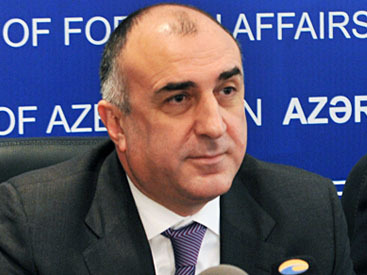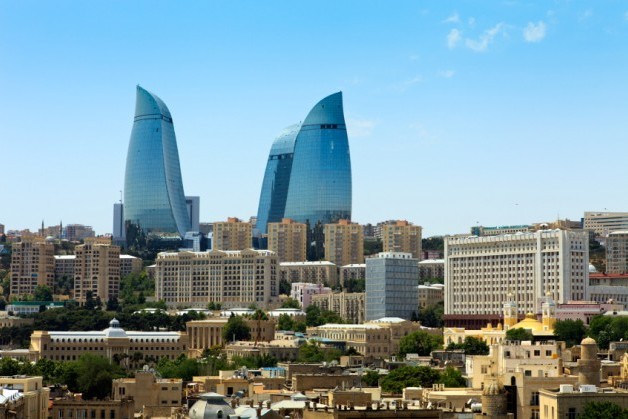The following is an interview with Minister of Foreign Affairs of the Republic of Azerbaijan Elmar Mammadyarov. ― Ed.
Korea Herald: Azerbaijan is located in a geopolitically strategic region. You said in a recent speech that you see Azerbaijan as a “bridge builder” and “peace promoter” in the region. How can Azerbaijan accomplish this goal?
Mammadyarov: Azerbaijan is a multinational and multireligious country. The national policy of the country is defined on the principles of tolerance and coexistence of various nationalities, ethnic groups and religious minorities. For centuries, from generation to generation the people of Azerbaijan have been cultivating a culture of tolerance, respect and understanding.
 |
| Minister of Foreign Affairs of the Republic of Azerbaijan Elmar Mammadyarov |
Azerbaijan’s unique geographical location at a crossroads between East and West and its long-standing tradition of tolerance enable us to help build bridges between peoples and societies. Azerbaijan has offered the international community its resources and experience in the promotion of intercultural dialogue and understanding.
Azerbaijan is an active participant and initiator of various significant national and international events organized with the aim of promoting and disseminating ideas of cultural diversity. We are proud to actively cooperate in this field with authoritative international organizations, such as the U.N. Alliance of Civilizations, European Union, Council of Europe, UNESCO and ISESCO.
In 2008, Azerbaijan initiated the “Baku Process” for the promotion of intercultural dialogue worldwide. The special feature of this process is that it brings together people of different origins through various cultural and educational programs, tourism and youth activities. Within that process, in April 2011 and June 2013, under the patronage of the President of the Republic of Azerbaijan, the Government of Azerbaijan together with the U.N., UNESCO, ISESCO and Council of Europe hosted in Baku two World Forums on Intercultural Dialogue. High-level officials of governments, international organizations, academics, experts and representatives of civil society actively participated in these forums and significantly contributed to the strengthening of the ideas of multiculturalism.
 |
| Azerbaijan’s capital of Baku |
KH: It might lack access to any ocean, but Azerbaijan is perched on the Caspian Sea. It is also a source of tremendous oil wealth, which has attracted Western investors and has made the country a pivotal conduit for energy to Europe. Though its GDP has grown very fast, in what ways has the quality of life for the average Azerbaijani improved over the last 10 years?
M: Indeed natural endowments such as vast oil and gas reserves have played an immense role in Azerbaijan’s economic recovery. Azerbaijan has a long history of oil extraction and during World War II it supplied 80 percent of the oil for the whole USSR. Following the break-up of the Soviet Union the economy was on the brink of collapse. The signing of the “contract of the century” with a consortium of international oil companies for the exploration and exploitation of offshore oil fields in 1994 set the stage for an economic revival. Large-scale investments generated huge revenues which enabled the country to recover economically, develop the non-oil sector and improve social welfare.
We will celebrate the 20th anniversary of the signing of the “contract of the century” this year. Throughout these years Azerbaijan has built the trans-regional Baku-Tbilisi-Ceyhan oil and South Caucasus gas pipelines, anticipating the transfer of energy resources to its neighbors and European partners. Azerbaijan’s ambitious investment strategy has exceeded its domestic boundaries. As an enabler and contributor to the Southern Gas Corridor, in partnership with major European countries, Azerbaijan is committed politically and financially to the construction of the Trans-Anatolian Pipeline and Trans-Adriatic Pipeline to deliver Azerbaijani gas to Europe. The volume of investments is estimated to exceed $45 billion. In the meantime, the State Oil Company of the Republic of Azerbaijan is expanding its international investment portfolio in Eurasia by enabling retail presence and modernizing petrochemical companies abroad.
The geoeconomic location of Azerbaijan has transformed it into an important transportation hub. Through its improved transport network and harmonized tariffs Azerbaijan is capable of handling large-scale passenger and cargo flow along the East-West transport corridor. The Baku-Tbilisi-Kars railway project due to be operational in 2015 will offer a short, viable and reliable transit route between Europe and Asia.
These projects are not mere revenue generators; they have broader regional implications. They help to strengthen East-West dialogue. The initiated dialogue between Azerbaijan, Georgia and Turkey has demonstrated visible results in terms of promoting mutual interests at the regional level. We are eager to replicate this practice within the Turkey-Azerbaijan-Turkmenistan format to bring Central Asia closer.
These accomplishments encourage us to continuously foster a comprehensive domestic economy. The figures speak for themselves. In the last 10 years the volume of investments reached $172.4 billion, with FDI making up half of this figure. GDP increased threefold and reached $73 billion in 2013 while GDP per capita topped $7,900. The share of investments in the non-oil sector, which is about 64 percent, has fuelled the non-oil output, which counted for 54 percent of the GDP. This implies that Azerbaijan is continuing its efforts to reduce its dependency on oil and gas.
Unemployment has substantially dropped to 5 percent, which is four times less than the global medium rate. Poverty reduction has been an important target in almost all state economic development programs, which has largely contributed to addressing regional socioeconomic disparities. As a result, the poverty rate has sharply decreased to 5.3 percent from 50 percent in just 10 years. Strategic currency reserves have exceeded $50 billion, helping to shield the domestic economy from the risks of a global financial crisis.
KH: Azerbaijan still struggles with the so-called “frozen conflict” at home with its 20 year ceasefire (signed in 1994) with Armenia. What are some recent steps taken to resolve this conflict?
M: Armenia-Azerbaijan Nagorno-Karabakh conflict can hardly be called frozen. Considering the fact that Armenian agression against Azerbaijan continues and Armenia instead of seeking negiotiated solution of conflict through its provocative attempts regularly violates cease-fire regime and creates further tensions.
Conflict continues to represent a serious threat and challenge to international and regional peace and security and hinders materialisation of sustainable regional development in full capacity in the South Caucasus. The conflict has resulted in the occupation of almost 20 per cent of the territory of Azerbaijan and has made more than one million internally displaced persons or refugees. The war has led to the deaths and wounding of thousands of people including women, the elderly and children. No single Azerbaijani historic and cultural monument was left undamaged, and no sacred site escaped desecration in the occupied territories and in Armenia.
Our view on the solution of the conflict between Armenia and Azerbaijan is pretty clear and it is based on the fundamental principles of international law, four resolutions of the United Nations Security Council, and documents and resolutions of other international organizations.
We sincerely believe that there is no alternative to peace, stability and mutually beneficial regional cooperation. Without prejudice to its rights under the U.N. Charter, in particular those set forth in Article 51, Azerbaijan embarked on and remains committed to the conflict settlement process, being confident that its objective is to put an end to the illegal Armenian occupation, to restore the sovereignty and territorial integrity of Azerbaijan, to ensure the return of forcibly displaced people to their homes and to guarantee the peaceful coexistence of Armenian and Azerbaijani communities in the Nagorno-Karabakh region of the Republic of Azerbaijan. We firmly believe that by eliminating military consequences of the Armenian occupation along with launching confidence building measures is the proper way towards the peaceful resolution of the conflict.
But, instead of starting to work on Comprehensive Peace Agreement based on this vision and updated Madrid principles, attempts by the Armenian side to misinterpret the norms and principles of international law and its insistence on unrealistic annexationist claims, which Azerbaijan will never accept, represent an open challenge to the conflict settlement process and create serious risk for negotiations.
Armenian leadership has to understand that demonstrating constructive approach and denouncing its annexionist policy towards its neighbour will change security perceptions in the region and positively affect the peace negotiations process.
KH: President Ilham Aliyev visited to Seoul for the Seoul nuclear security summit in 2012. Please highlight with specific examples how bilateral relations between Azerbaijan and South Korea have grown the past five years.
M: Azerbaijan attaches great importance to its relations with the Republic of Korea. Mutually beneficial cooperation between Azerbaijan and Korea are continuing and expanding from year to year.
Over the past five years the two countries exchanged many high level visits in economic, military, judicial and parliamentary areas. Exchange visits of Speakers and Vice-speakers of Parliaments of both countries had created new opportunities on development of cooperation among legislative bodies. Cooperation in the field of defense has also started to develop following with mutual high level visits past two years.
The Azerbaijani government considers Korea one of the major partners in the world with which it carries on political, economic and trade cooperation. Economic relations between Azerbaijan and Korea are active, especially in sectors such as transport, information and telecommunications, alternative energy, know-how, environment and construction. Trade turnover between the countries has increased significantly in 2011 ($654 million) and in 2013 amounted $264 million. For the 2008-2012-years, the volume of Korean investment in the economy of Azerbaijan has made 150 million dollars. In 2014 the State Oil Fund of Azerbaijan (SOFAZ) purchased prime office complex “Pine Avenue Tower A” in Seoul.

